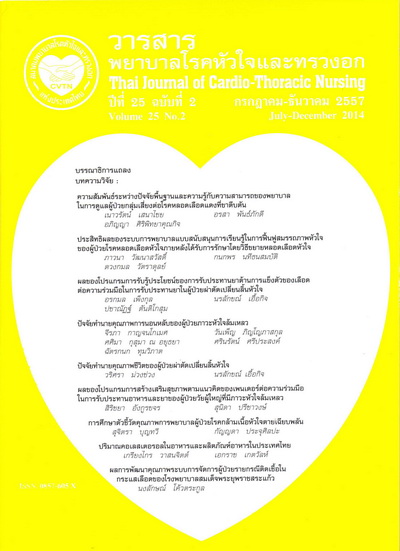ผลการพัฒนาคุณภาพระบบการจัดการผู้ป่วยรายกรณีติดเชื้อในกระแสเลือดของโรงพยาบาลสมเด็จพระยุพราชสระแก้ว
คำสำคัญ:
ผู้ป่วยติดเชื้อในกระแสเลือด, ระบบการจัดการดูแล, การจัดการผู้ป่วยรายกรณี, Sepsis, Quality care improvement, Case managementบทคัดย่อ
การวิจัยครั้งนี้เป็นการวิจัยเชิงปฏิบัติการ เพื่อพัฒนาคุณภาพระบบการจัดการผู้ป่วยติดเชื้อในกระแสเลือด โดยประยุกต์ใช้ระบบการจัดการรายกรณี กลุ่มตัวอย่างที่ศึกษาได้แก่ อายุรแพทย์ เภสัชกร นักเทคนิคการแพทย์ และพยาบาลผู้จัดการรายกรณี ที่ปฏิบัติงานในกลุ่มงานอายุรกรรม จำนวน 20 คน และผู้ป่วยที่ติดเชื้อในกระแสเลือด (Sepsis) จำนวน 797 ราย ผู้วิจัย ทีมสหสาขาวิชาชีพ และพยาบาลผู้จัดการรายกรณีร่วมกันวิเคราะห์ปัญหารากเหง้า (Root cause analysis) และจัดตั้งทีมดูแลผู้ติดเชื้อในกระแสเลือด ประยุกต์ใช้ระบบการจัดการ รายกรณี ได้แก่พัฒนาศักยภาพพยาบาลผู้จัดการรายกรณีดูแลผู้ป่วย ใช้มาตรฐานการดูแลได้แก่ แนวทางปฏิบัติในการรักษาและแผนการดูแลผู้ป่วยติดเชื้อในกระแสเลือด (Sepsis CNPG, Sepsis CPG, Sepsis Care Maps) และแก้ไขปัญหาตามกระบวนการวิจัยเชิงปฏิบัติการ เครื่องมือที่ใช้ในการเก็บรวบรวมข้อมูล ได้แก่ แบบบันทึกทาง การพยาบาล แบบประเมินประสิทธิภาพการใช้กระบวนการพยาบาล แบบบันทึกการปฏิบัติตามแนวทางการดูแลผู้ป่วยติดเชื้อในกระแสเลือด เก็บรวบรวมข้อมูลเชิงคุณภาพโดยการบันทึกเทปการสนทนากลุ่ม ประชุมระดมสมอง และการแลกเปลี่ยนเรียนรู้ เก็บข้อมูลเชิงปริมาณผลลัพธ์ตัวชี้วัดคุณภาพผู้ป่วยรายโรค วิเคราะห์ข้อมูลโดยใช้สถิติ เชิงพรรณนาและวิเคราะห์เนื้อหา
ผลการวิจัย พบว่าทีมพยาบาลผู้จัดการรายกรณีเป็นแกนหลักพัฒนาคุณภาพแบบมีส่วนร่วม และประสานการดูแลผู้ป่วยระหว่างทีมสหสาขาวิชาชีพให้มีประสิทธิภาพเพิ่มขึ้น มีการจัดตั้งทีมดูแลผู้ป่วยติดเชื้อกระแสเลือด ปรับปรุงแนวทางการประเมินผู้ป่วยในระยะแรก(early warning sign) และพัฒนาระบบการดูแลผู้ป่วยแบบรวดเร็ว(Sepsis Fast Track) เพื่อให้ผู้ป่วยปลอดภัยและลดภาวะแทรกซ้อน ผลการวิจัยพบว่า (1) ผู้ป่วยเสียชีวิตจาก ติดเชื้อในกระแสโลหิตลดลงจากร้อยละ 43.27 เป็นร้อยละ 41.14 , (2) อัตราการรักษาภาวะติดเชื้อในกระแสเลือดภายใน 6 ชั่วโมงหลังวินิจฉัยถูกต้อง เหมาะสมเพิ่มขึ้นจากร้อยละ 21.16 เป็นร้อยละ 71.14 , (3) อัตราการเกิด ภาวะหายใจล้มเหลวลดลงจากร้อยละ 55.36 เป็นร้อยละ 44.12 (4) ระยะเวลาในการนอนในโรงพยาบาลจาก 32.15 วันเป็น 19.24 วัน (5) ค่าใช้จ่ายในการรักษาลดลง
ข้อเสนอแนะ : ผู้บริหารทางการพยาบาลควรส่งเสริมให้พยาบาลแสดงบทบาทผู้จัดการรายกรณีในการเป็นผู้ประสานงานและมีส่วนร่วมกับทีมสหสาขาวิชาชีพในการจัดระบบการดูแลอย่างต่อเนื่อง ควรมีการติดตามประเมินผลอย่างเป็นระบบในการดูแลผู้ป่วยติดเชื้อในกระแสเลือดให้มีประสิทธิภาพอย่างรวดเร็วและปลอดภัย
Effects of Using a Case Management System to improvethe quality of care for the Sepsis Patients in Sakaeo Crown Prince Hospital
This action research aimed to develop a care management system for the sepsis patients based on case management. The purposive sampling technique was used to obtain 20 multidisciplinary healthcare providers such as physicians, pharmacists, laboratory technicians, nurse case managers including 797 sepsis patients in Sakaeo Crown Prince Hospital. Multidisciplinary team and nurse case manager participated in root cause analysis and set up sepsis care team. The team used case management system including capacity building of nurse case manager and applied standard of care such as sepsis patient clinical guideline of Sepsis, Sepsis CPG, Sepsis Care Maps through the process of action research. Qualitative data were collected using tape record of focus group interviews, brain storming meeting, and knowledge management. Quantitative data were collected health outcome indicators of the patients. Data were analyzed using descriptive statistics and content analysis.
The results showed that nurse case managers were key persons to participate in sepsis care team in collaborating with multidisciplinary team by establishing sepsis care team, improving patient’s assessment of early warning signs and a Sepsis Fast Track care focused on patient safety and complication reduction. The results illustrated that (1) decreased sepsis mortality rate from 43.27 % to 41.14 %, 2), increased early goal directed therapy rate (EGDT Rate) from 21.16 % to 71.14 %, 3) decreased respiratory failure rate from 55.36% to 44.12%, (4) decreased Length of stay from 32.15 days to 19.24 days, and (5) decreased cost of care.
Recommendation : The nurse administrator should promote nurses to be case managers in collaborating care with multidisciplinary team continuously. In addition, sepsis care system should be systematically monitored and evaluated outcome in terms of timely, effectiveness, and safety.
ดาวน์โหลด
เผยแพร่แล้ว
รูปแบบการอ้างอิง
ฉบับ
ประเภทบทความ
สัญญาอนุญาต
บทความนี้ยังไม่เคยตีพิมพ์หรืออยู่ในระหว่างส่งไปตีพิมพ์ในวารสารอื่น ๆ มาก่อน และกองบรรณาธิการขอสงวนสิทธิ์ในการตรวจทาน และแก้ไขต้นฉบับตามเกณฑ์ของวารสาร ในกรณีที่เรื่องของท่านได้ได้รับการตีพิมพ์ในวารสารฉบับนี้ถือว่าเป็น ลิขสิทธิ์ของวารสารพยาบาลโรคหัวใจและทรวงอก






